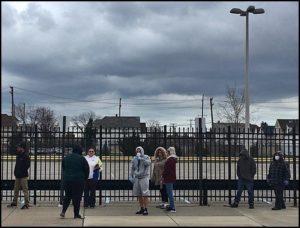City Life: Changing behavior will help defeat virus

Hamtramck’s dense population makes it especially vulnerable to the COVID-19 outbreak. As hard as it is, one way to combat its spread is to maintain social distancing – keeping at least 6 feet apart from one another. That doesn’t always work out though.
By Walter Wasacz
The hard truth is that Hamtramck, which claims to be the state’s most densely populated city, is in the direct path of the biggest health crisis the world has seen in 100 years.
Not only in the path but potentially a hotspot within Michigan’s Covid-19 outbreak epicenter: Detroit.
And it’s here now, often presenting itself without symptoms. But it’s still spreadable regardless.
It’s foolhardy to separate ourselves because of political borders: people on either side of Conant or Carpenter — borders we share with our bigger neighbor — are just as likely to be exposed Covid-19 and to unknowingly participate in its community spread.
In the tight, dense, urban quarter in which we live the potential for exposure is ever present.
A virus, in this case a highly contagious and deadly virus, respects no boundaries. All humans: brown, black, yellow, white; Buddhists, Muslims, Christians, Hindus, people with no religion; none of us are immune so long as we live and breathe.
Men, women, young and old: all generations are potential hosts, spreaders and victims. There are now about 350 people in Michigan who have died. In the months to come, experts’ projections reveal that the total could be in the thousands.
But we can all do something very simple to help challenge those dire projected outcomes: stay home, and if you need to go out for the essentials — food, medicine, a brisk walk for fresh air and exercise — keep at least a 6-foot physical distance from others.
We should, many experts say, act as if we already have the virus. We should act as if others are infected and can spread the virus.
Scary? You bet.
But in this case fear is the appropriate emotional response, a way to guide an appropriate behavioral response.
Changing our behavior by distancing ourselves from other people is the most effective way we can slow and eventually stop the advance of this deadly disease.
That behavior will work in Hamtramck, Detroit and everywhere. It may be inconvenient, it may be boring but imagine this: all of us, independently, can form a collective, invisible bond that will help save lives. Lots of lives.
In time it will all be worth it.
Walter Wasacz has been in self-quarantine for the past three weeks. He’ll be writing about the public health crisis as long as there is one. Follow his photojournal here:
https://www.instagram.com/nospectacle/
Posted April 3, 2020

